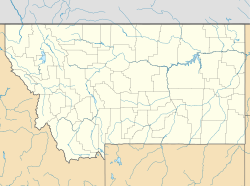Anaconda, Montana
| Anaconda, Montana | |
|---|---|
| City | |

Downtown Anaconda, looking north
|
|
| Location in Montana | |
| Coordinates: 46°8′N 112°56′W / 46.133°N 112.933°WCoordinates: 46°8′N 112°56′W / 46.133°N 112.933°W | |
| Country | United States |
| State | Montana |
| County | Deer Lodge |
| Area | |
| • Total | 741.2 sq mi (1,919.7 km2) |
| • Land | 736.5 sq mi (1,907.6 km2) |
| • Water | 4.7 sq mi (12.1 km2) |
| Elevation | 5,276 ft (1,608 m) |
| Population (2010) | |
| • Total | 9,298 |
| • Estimate (2015) | 9,139 |
| • Density | 13/sq mi (4.9/km2) |
| Time zone | Mountain (MST) (UTC−7) |
| • Summer (DST) | MDT (UTC−6) |
| ZIP code | 59711 |
| FIPS code | 30-01675 |
| GNIS feature ID | 779015 |
| Website | adlc |
Anaconda, county seat of Deer Lodge County, which has a consolidated city-county government, is located in southwestern Montana of the United States. Located at the foot of the Pintlar Mountains, the Continental Divide passes within 8 mi (13 km) south of the community. As of the 2010 census the population of the consolidated city-county was 9,298, with a per capita personal income of $20,462 and a median household income of $34,716. It had earlier peaks of population in 1930 and 1980, based on the mining industry. It is still the ninth most populous city in Montana. Central Anaconda is 5,335 ft (1,626 m) above sea level, and is surrounded by the communities of Opportunity and West Valley.
The county area is 741 square miles (1,920 km2), characterized by densely timbered forestlands, lakes, mountains and recreation grounds. The county has common borders with Beaverhead, Butte-Silver Bow, Granite, Jefferson and Powell counties.
Anaconda was founded by Marcus Daly, one of the Copper Kings, who financed the construction of a smelter on nearby Warm Springs Creek to process copper ore from the Butte mines. In June 1883, Daly filed for a town plat for "Copperopolis", but that name was already used by another mining town in Meagher County. Instead, Daly accepted the name "Anaconda", suggested by the United States postmaster of the time, Clinton Moore. When Montana was admitted as a state in 1889, Daly lobbied to have the capital moved here, but it stayed in Helena, a location supported by rival William Andrews Clark.
In 1903, the Socialist Party of America won its first victory west of the Mississippi when Anaconda voters elected a socialist mayor, treasurer, police judge, and three councilmen. The Socialist Party had grown within the expanding Montana labor movement. Initially, the Anaconda Copper Mining Company tolerated socialist activities, but when the Socialists gained political power and threatened to implement reform, the company systematically undermined the radical party. City workers and councilmen refused to cooperate with the new mayor, and the company began to fire Socialists. In the long run labor lost ground in Anaconda and the company exerted ever greater political control.
...
Wikipedia

